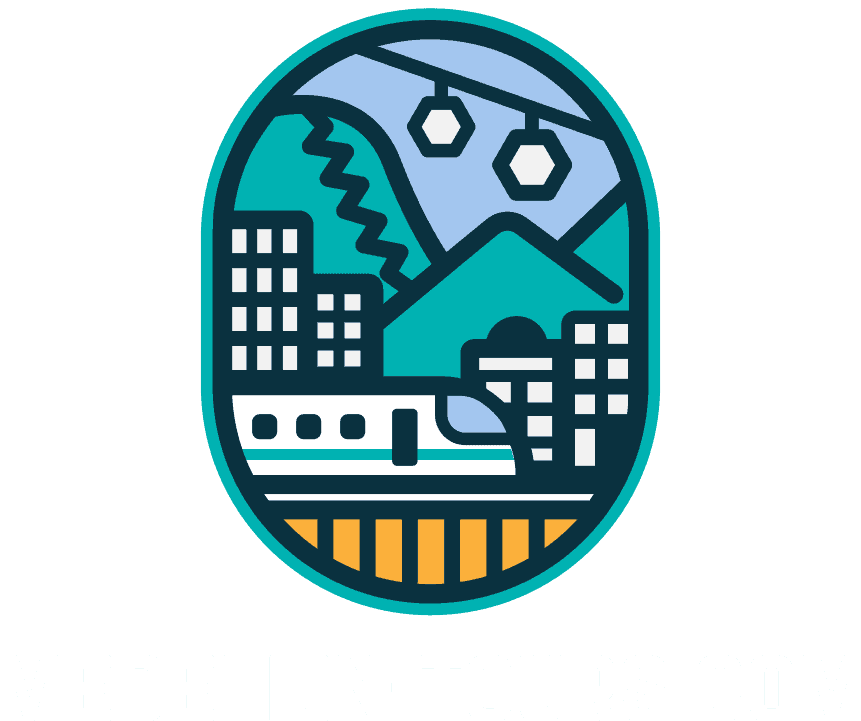
What to expect during the One-Day Coffee & Spa tour:
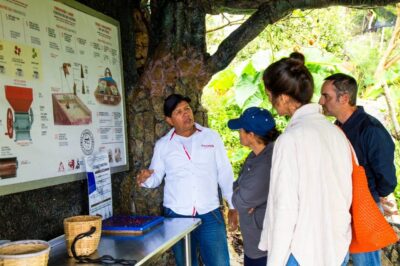 Looking for a different, fun, and educational activity? Well, with this tour you will be able to experience all of that!
Looking for a different, fun, and educational activity? Well, with this tour you will be able to experience all of that!
Connect with nature and learn all about coffee, while you relax and immerse yourself in the coffee culture of Antioquia. If you resonate with all of this let me tell you that this tour is designed for you. 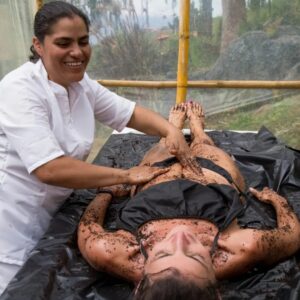
It combines a learning experience, Spa, and Nature. We will take you to Arvi Park and there you will be picked up to take you through the “Sendero de los arrieros” (muleteer’s path), walk through the coffee cultivation, and learn all about harvesting and producing coffee.
That’s not all! We will finish the afternoon with a unique sensory spa experience based on coffee in our Coffee Wellness Spa. And of course, you can’t leave without our specialty coffee tasting. Certificate included.
What to expect during the One-day One-Night Coffee & Spa tour:
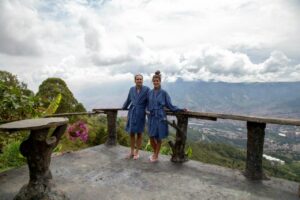 If you liked all of the above, but want to have a full immersion experience, we recommend the One-Day One-Night tour.
If you liked all of the above, but want to have a full immersion experience, we recommend the One-Day One-Night tour.
We will pick you up at the door of your hotel and take you to Arví Park, from there we will welcome you and take you to the Mirador Cafe Tostado (Viewpoint Cafe Tostado), then you will have a BBQ dinner while we light the bonfire, and enjoy a spectacular view of the city of Medellin.
Have a great and comfortable night of sleep at Cueva del Café (your room).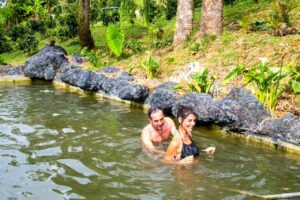
Day 2: Start the morning with the perfect and most delicious cup of fresh ground Coffee and delight yourself with an Antioqueño breakfast, from there you will start the tour of coffee and learn how is cultivated, harvested, and processed.
Finish the tour with a relaxing therapy that includes a coffee massage, Coffee Temazcal (coffee sauna), and submerge your body in the Naox Mantial.
A Brief History of Colombian Coffee:
In Colombia, our breathtaking landscapes of mountains and lush coffee plantations immerse us in a world of captivating aromas, rich textures, and delightful flavors, which all accompany the cherished tradition of coffee cultivation in our country. With a history of around 300 years, the captivating tale of Colombian coffee is believed to have begun when Jesuit fathers introduced this magical elixir to our land. It is said that the national coffee culture was indirectly promoted by Jesuit priest Francisco Romero, who assigned coffee planting as a penance for his parishioners during confessions.
The year 1835 marked a significant milestone when the first bags of coffee produced in the eastern zone were exported through the Cúcuta customs office. These seeds paved the way for coffee’s presence in the northeastern department of Santander, and by 1850, it had spread to the central and western regions, encompassing Cundinamarca, Antioquia, and the area formerly known as Caldas.
The late 19th century witnessed an astounding surge in production, growing from 60,000 sacks to over 600,000 sacks. It’s worth noting that the majority of this production came from the estates of large landowners, and by the close of the century, coffee had become Colombia’s main export, contributing significantly to foreign currency earnings.
To further strengthen the coffee industry, the National Federation of Coffee Growers was established in 1927 to represent the interests and welfare of coffee growers.
In 1938, a pivotal milestone was achieved with the founding of the research center, CENICAFE, which was responsible for groundbreaking achievements, including the development of the rust-resistant Castillo variety.
The year 1959 brought forth two momentous events for Colombian coffee. Firstly, the iconic character of Juan Valdez was born, becoming a symbol of our coffee culture. Secondly, the first Colombian Coffee office was inaugurated in Tokyo, propelling Japan to become the second-largest consumer of Colombian coffee worldwide.
In 1984, the distinctive seal of Café de Colombia was created, becoming a recognizable mark that represents Colombian coffee’s exceptional quality across the globe.
